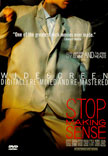STOP MAKING SENSE - REVIEWS/PRESS

By Janet Maslin, The New York Times, October 19, 1984
From the opening frames of Jonathan
Demme's ''Stop Making Sense,'' which opens today at the 57th Street
Playhouse, it's apparent that this is a rock concert film that looks
and sounds like no other. The sound is extraordinarily clear, thanks
to the pioneering use of 24-track digital recording. And the film's
visual style is as coolly iconoclastic as Talking Heads itself. Mr.
Demme has captured both the look and the spirit of this live performance
with a daring and precision that match the group's own.
It's worth noting some of the things that are not to be found here: screaming crowds, gaudy skintight costumes, candid scenes of the band members backstage. Talking Heads' performance style is unlike anything that has ever been captured by a standard concert film, and Mr. Demme is very well attuned to the group's eccentricities. Even the first image - the shadow of a guitar neck looming against a white wall - wittily suggests the menacing and mechanistic qualities of Talking Heads' music, as well as the clean, bold visual imagery they manage to make so surprising. The sight of this sexually and racially integrated nine- member ensemble, in white sneakers and neutral-colored playsuits, jogging in place as if practicing aerobics becomes at least as exciting as any standard rock spectacle.
The focus of both the film and the performance is David Byrne, the lead singer, who is one of the group's four core members. With his hollow-eyed stare and bizarre gestures, Mr. Byrne is surely one of the oddest rock singers; he's also one of the most galvanizing. Mr. Byrne, or at least the sight of his sneakers, is initially seen alone, wandering onto the stage to perform the stark and rousing version of ''Psycho Killer'' that begins the show. (The other band members enter one at a time, a new one with each song, as a technical crew wanders conspicuously in their midst. Only in its latter half does the film build into an elaborately staged production, with Mr. Byrne in his Big Suit costume and words like ''time clock'' and ''dustballs'' flashing on a colored backdrop.)
Mr. Byrne's studied casualness is matched by a fierce intensity. Even his most peculiar gestures - darting his head and tongue like a lizard, or dancing with stiff, jerky motions and a perfectly immobile torso - have an originality and a mesmerizing strangeness.
And Mr. Byrne's vocals maintain their lucid, unsettling energy throughout the performance (the film actually draws upon four 1983 concerts at the Pantages theater in Hollywood). The film includes especially fine renditions of such Talking Heads classics as ''Life During Wartime,'' ''Heaven,'' ''Once in a Lifetime'' and ''Burnin' Down the House.''
Mr. Demme, in addition to avoiding any visual monotony, has gracefully tailored the film to suit the band's stage show. Using long, slow camera motions (the handsome cinematography is by Jordan Cronenweth), he captures the group members at close range without losing the overall visual effects they achieve on stage. The show's conception, which is both subtle and sophisticated, is credited to Mr. Byrne.
''Stop Making Sense'' owes very little to the rock
film-making formulas of the past. It may well help inspire those
of the future.

